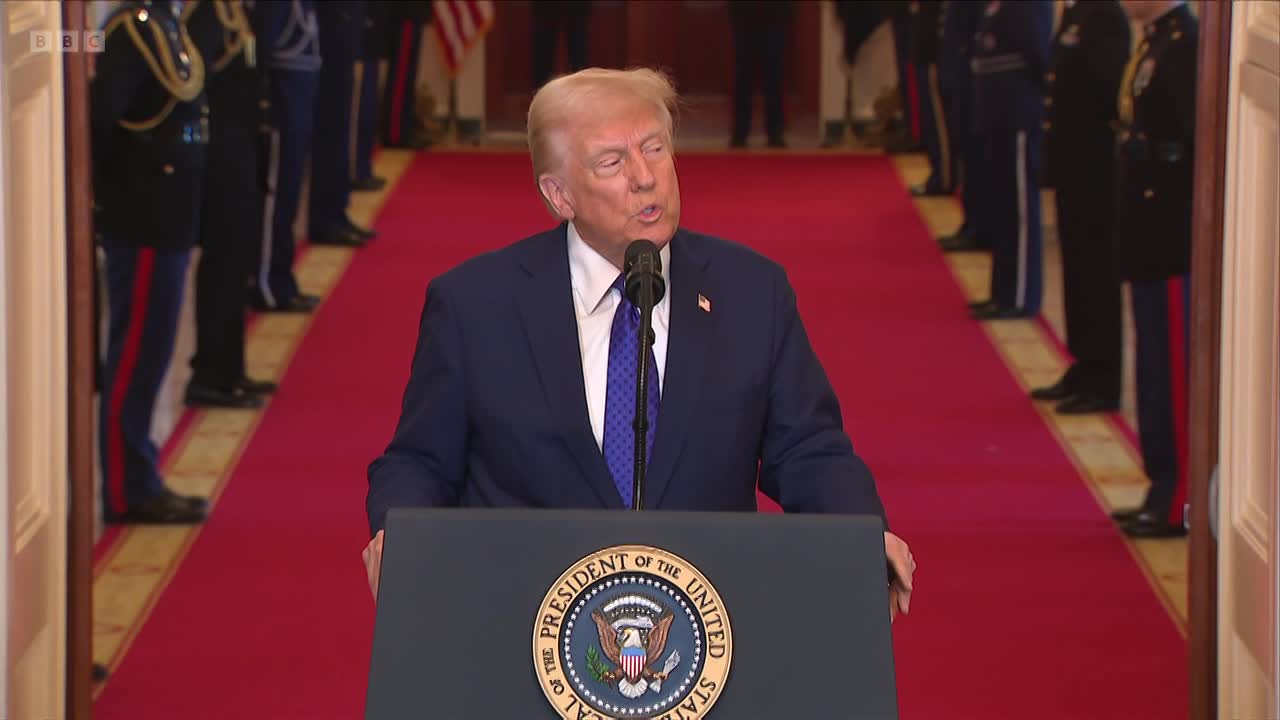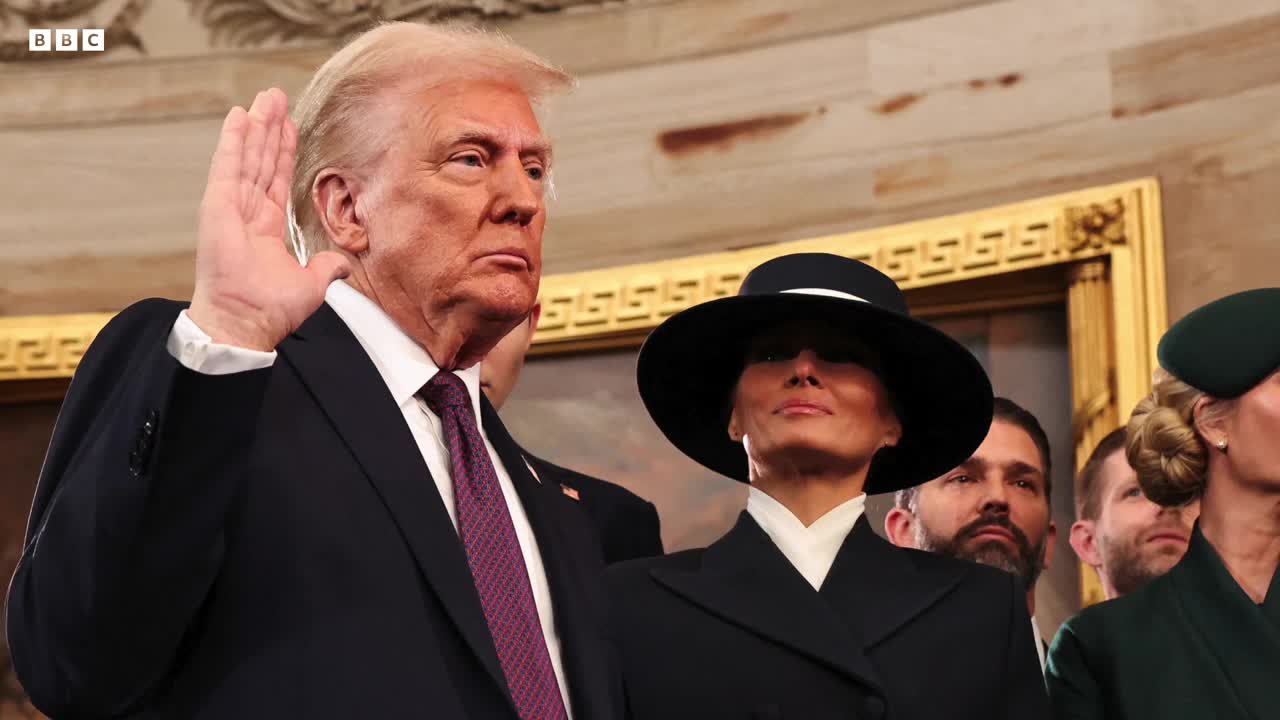Breaking: Trump Administration Reverses Controversial Freeze on Federal Grants and Loans Amid Public Outcry
In a dramatic reversal, the White House announced that it had canceled a memo that had approved freezing hundreds of billions of dollars in federal grants and loans.
This decision comes after days of confusion and widespread panic, particularly among the millions of Americans who rely on government assistance for basic services like healthcare, housing, and food.Initially signed by President Donald Trump, the memo issued by the Office of Management and Budget (OMB) had instructed federal agencies to temporarily halt all activities related to federal financial assistance.
The freeze was designed to give the new administration time to assess the alignment of grants and loans with its policy priorities. However, this move sent shockwaves through nonprofit organizations, state governments, and individuals dependent on federal aid, triggering lawsuits and mass confusion.
Watch: President Trump says funding freeze was short-term to 'look at scams'
The turmoil reached a boiling point when a judge temporarily blocked the freeze on Tuesday, halting its implementation for at least a week.
The court’s intervention followed a lawsuit filed by organizations representing grant recipients, which argued that the freeze would devastate crucial services across the country.
In response, the White House issued a new statement on Wednesday announcing that the OMB memo had been canceled.
Despite the apparent reversal, White House Press Secretary Karoline Leavitt emphasized that the broader executive orders related to freezing federal funding remain intact.
This means the Trump administration still intends to scrutinize the allocation of federal funds in a manner consistent with its political agenda, although the immediate freeze on grants and loans will not move forward.
The freeze had initially caused significant disruptions. Affected programs included Medicaid, which provides health insurance for low-income Americans, as well as housing and food assistance programs like SNAP (Supplemental Nutrition Assistance Program).
States reported issues accessing critical funds, and aid organizations warned that the move could cripple services for vulnerable populations, including military veterans, survivors of domestic violence, and children in need of childcare. While the White House clarified that some programs, such as Social Security benefits, would not be affected by the freeze, many nonprofit leaders and service providers were left in the dark about which programs would be impacted.
Diane Yentel, president and CEO of the National Council of Nonprofits, expressed relief after the memo was canceled, but also called the chaos and uncertainty "reckless and harmful." Yentel pointed out that critical services, including homelessness and housing assistance, disaster relief, and mental health support programs, were all at risk due to the freeze.
What This Means for USAID Funding and International Aid
While the immediate freeze on domestic programs has been paused, the broader implications of the executive orders on federal funding remain a point of concern, particularly for international aid programs like USAID (United States Agency for International Development).
USAID has long been a critical player in providing humanitarian assistance and development aid around the globe, addressing issues from disaster relief to poverty reduction.
A freeze on USAID funding could have severe consequences for global health and development initiatives, particularly in conflict zones and low-income countries.
Trump’s administration has previously indicated a desire to reduce foreign aid and prioritize domestic concerns over international obligations. If these cuts were to be enacted, they could undermine U.S. influence in global health, human rights, and development programs, just as the world faces a multitude of crises, including the ongoing pandemic and climate change challenges.
The decision to freeze federal grants and loans sparked intense political backlash, with Democrats accusing the Trump administration of overreach and irresponsible governance. Senate Democratic Minority Leader Chuck Schumer condemned the freeze as "lawless," asserting that it aimed to "hurt families and help their billionaire friends." He added that public outcry and advocacy from state governments and nonprofits played a significant role in forcing the White House to back down from the freeze.
On the other hand, White House officials defended the freeze as a necessary step to scrutinize government spending, particularly in areas related to "woke" gender and diversity programs. Despite the rescindment of the memo, it’s clear that the administration's commitment to reining in federal spending and realigning financial priorities will continue to shape the conversation moving forward.
Although the immediate panic has been alleviated, the long-term uncertainty about federal funding is far from over. The freeze was part of a broader push to reduce government spending and limit the scope of federal programs, especially those perceived as extraneous to the administration’s goals. If similar freezes or cuts to federal programs are enacted in the future, they could have profound consequences on vulnerable populations that rely on government assistance.
Watch: Almost everything Trump did in his whirlwind first weeK - CC: BBC
Moreover, the ongoing ambiguity regarding which programs will be spared and which will be targeted leaves many in a precarious position. Nonprofits, social service providers, and state agencies are now left to navigate a complex landscape where the government’s priorities could shift at any moment, creating an environment of constant unpredictability.
As of now, it’s unclear how the White House plans to proceed with its broader freeze on federal funding, and whether the judge’s injunction will hold until next Monday or longer.
But one thing is certain: the debate over government spending, domestic welfare programs, and international aid is far from over, and the future of federal financial assistance remains uncertain.
For now, millions of Americans who rely on federal grants and loans for essential services can breathe a sigh of relief — but only temporarily. The broader battle over the role of government and the allocation of public funds is just beginning.
CC: BBC
Join the Daily West Nile WhatsApp group now to never miss an update from us.Download Host Media Now from the Play Store to watch HostTV, listen to Host Radio Live, and stay informed—all in one convenient app!

